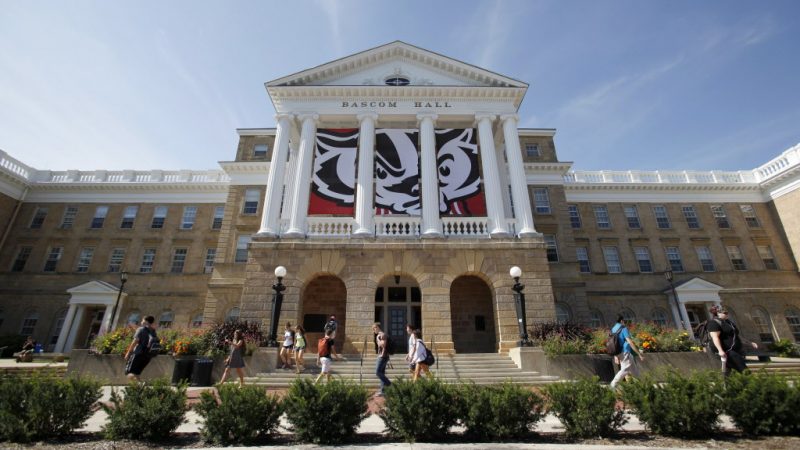Shared governance advocates remain skeptical of UW System presidential finalist Jim Johnsen’s promises to share leadership with campuses and work with lawmakers.
Johnsen, University of Alaska System president, told viewers Tuesday at a virtual campus forum “leadership is more powerful when it’s shared,” and that, if he were selected as the next UW president, he would “repair” relationships with legislative leaders to navigate through upcoming financial challenges.
“Relationships have to be founded on trust and mutual interest,” he said. “Advocacy is critically important, and it can’t be just one voice doing it.”
Johnsen added he was excited to see “The Wisconsin Idea” in action, and that he would advocate alongside campuses to keep the system strong throughout the state.
But UW-River Falls Faculty Senator John Heppen in an email to the campus community said some of Johnsen’s statements showed he is more concerned with politicians and administration than faculty or staff.
“He mentioned and complained how Alaskans do not pay state income tax and expect a handout in the form of the Alaskan dividend check based on oil revenues,” Heppen said. “This is the type of language employed by those who feel society is made up of producers or makers and takers.”
The UWRF Faculty Senate will hear a resolution today that would reject Johnsen’s candidacy and call on all faculty and staff, including UWRF Chancellor Dean Van Galen, to join in opposition.
Johnsen during the forum mentioned there should be “no question” that shared governance has a voice in university decisions, even if “they don’t always get their way.”
Rep. Dave Murphy, chair of the Assembly Committee on Colleges and Universities, told WisPolitics.com Johnsen answered some “tough questions,” and that he appeared to be able to continue outgoing UW System President Ray Cross’ efforts to build working relationships with lawmakers.
“I’m optimistic that he will be somebody we’ll be able to work with going forward,” the Greenville Republican said. “At the end of the day, somebody has to be a decision-maker. And from that standpoint, I’m hoping anyway that he’s that strong individual that will be able to gather the information and make the tough decisions.”
Murphy said the system needs a leader to navigate upcoming financial challenges through the COVID-19 recession and long-term projections of declining enrollment. Those are two topics Johnsen addressed.
Johnsen touted his negotiations with the Alaskan government to lower an initial 41 percent budget cut as experience in tackling fiscal challenges.
He suggested any kind of “knee-jerk disruption” in funding does indeed create some frays in the relationship between administration and campuses but that he would try to “bring some healing on that front” to Wisconsin if he gets the job.
Meanwhile, the entire search process itself has continued to garner criticism from staff and faculty for presenting only one finalist for shared governance to review.
“To put forward a single candidate for public scrutiny, and not a set of candidates that reflects the diversity of our state and campuses is, by itself, deeply anti-democratic,” read a statement by the American Federation of Teachers-Wisconsin Higher Education Council.
The HEC then called on the Board of Regents to restart the search process with a diverse group of faculty, staff and students as committee members. The system’s presidential search committee consists of four regents, two former regents, two chancellors and one provost, but no faculty or staff members.
Regent Vice President Mike Grebe in last week’s regents meeting defended the committee’s decision to put forward Johnsen as the only candidate, arguing all other options would be too burdensome or disingenuous to other candidates since Johnsen had been “the very clear favorite” since the semi-finalist phase.
After an interview blitz, the presidential search committee will review Johnsen’s candidacy one last time and vote to present him to the Board of Regents as Cross’ successor. The committee hasn’t yet revealed exactly when the final vote on Johnsen will take place, though its website says the system president-designate will be announced in June.
A UW System spokesman previously told WisPolitics.com the next president’s salary would probably exceed $626,000 to remain competitive with other systems.
Cross revealed last fall that he would retire as system president once regents nominate someone else.
Watch on WisconsinEye.
See the UWRF resolution.
See AFT-Wisconsin’s statement.




